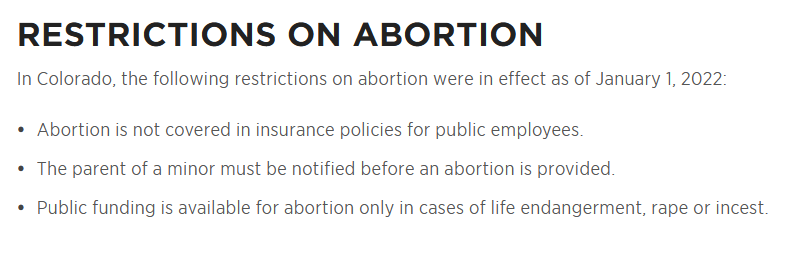On April 7, 2022 PolitiFact published a fact check concerning Colorado’s new abortion law. PolitiFact drew immediate criticism on social media for failing to support its conclusion.
Colorado law and late term abortion
After a Facebook post said Colorado’s law codifying state abortion rights made abortion legal up until delivery, PolitiFact stepped in to fact check. PolitiFact’s fact check, by Sara Swann, said the new law did no such thing.
Justifying the claim proved harder than making it. As many pointed out on social media, PolitiFact gave the game away early:
Colorado’s law protects the right to have an abortion and does not make destinctions (sic) or regulations around a time or stage during pregnancy.
That admission about the law seems to directly imply that Colorado allows abortion at any stage of a pregnancy. That would appear to include the stage of pregnancy immediately preceding childbirth.
What fact-checking sorcery can PolitiFact use to escape this quandary?
U.S. abortion law in brief
The landmark Roe v Wade decision prevents states from regulating abortion prior to fetal viability. Viability, the point at which the fetus could survive outside the womb, may vary from case to case. After the point of viability, Roe has no effect on states’ power to regulate abortion. Colorado sets few restrictions. The Guttmacher Institute, once part of Planned Parenthood, says:

States decide how to restrict abortion after viability under the Roe v Wade framework.
Punt to the Washington Post
PolitiFact explained to its readers that Roe v Wade protects abortion from state regulation until the point of fetal viability. After that, it punted the legal issue to the Washington Post:
While viability is determined on a case-by-case basis and dependent on a variety of factors including gestational age and fetal weight, a baby that is in the process of being born — or “moments before birth” — is unlikely to meet the standard under which abortion is legal.
Unfortunately for PolitiFact, the Post article did not directly address the issue. The article, from Feb. 6, 2019, discussed late-term abortion, the law regarding late-term abortion with emphasis on fetal viability and the frequency of the procedure. It mentions a New York law permitting late term abortions where the fetus lacks viability or the pregnancy threatens the life or health of the mother. There it links to a fact check calling President Trump wrong that a New York law allowed abortion up through the moment of birth.
Here’s the Washington Post Fact Checker’s reasoning, in full:
The legislation in New York would not have “allowed a baby to be ripped from the mother’s womb moments before birth.” It states a health care practitioner “may perform an abortion when, according to the practitioner’s reasonable and good faith professional judgment based on the facts of the patient’s case: the patient is within twenty-four weeks from the commencement of pregnancy, or there is an absence of fetal viability, or the abortion is necessary to protect the patient’s life or health.”
We think it obvious that “within twenty-four weeks from the commencement of pregnancy” counts as the key to finding Mr. Trump’s claim false. However, the law in New York seems to allow a last-second abortion to protect the patient’s life or health.
We fail to see how the Post’s finding would back a similar ruling for a law with no similar stipulation. Colorado law has no such stipulation.
Rare, therefore against the law?
With the unspecified and illusory “legal standard for abortion” duly established in the reader’s imagination, PolitiFact drove its point home with two irrelevant paragraphs:
Most abortions take place early on in a person’s pregnancy. According to the Centers for Disease Control and Prevention, nearly 93% of abortions in 2019 took place at or before 13 weeks gestation. About 6% occur between 14 and 20 weeks gestation.
Abortions being performed later in a pregnancy are rare; less than 1% occur at 21 weeks gestation or later, according to the CDC. Abortions around 21 weeks are often difficult to obtain because the procedure is costly, time-sensitive and only performed by a small subset of abortion providers.
Would PolitiFact argue that the rarity of late term abortions shows the Colorado law would not permit them up until the moment of birth? PolitiFact did not state that argument explicitly. But we cannot imagine the relevance of the two above paragraphs except in service to that argument.
The rarity of late term abortion carries no relevance regarding the legality of late term abortion.
Restating the argument in the conclusion?
With nothing established in logical support of its claim, PolitiFact proceeded directly to its concluding paragraphs. In keeping with the rest of its fact check, PolitiFact has only the rarity of late-term abortion with which to argue its point. After summarizing the claim it tried to fact check, PolitiFact offered its conclusion:
Colorado’s new law codifies existing protections around an individual’s right to use or refuse contraceptives, continue with a pregnancy and give birth, or to have an abortion.
Abortions that occur later in a pregnancy — at 21 weeks gestation or later — are rare.
We rate this claim False.
No logic backs PolitiFact’s “False” ruling. It might as well serve as the product of PolitiFact’s wishful thinking. Even if no abortion ever occurs in the moments before birth, a law may allow it.
Was the original claim correct?
Twitter user @bmlong137 pointed out the original claim from pro-life activist Lila Rose may imply the new Colorado law changed the legality of late term abortion. Instead, the new law codifies Colorado’s pre-existing stance on abortion.
Aside from that, Rose properly characterized the Colorado law. It contains nothing to restrict late-term abortion procedures up through the moment of birth.
If science has yet to develop a procedure to abort a baby mere seconds before live delivery, that has no bearing on whether the law allows it.
PolitiFact botched the fact check. It’s not the first time PolitiFact has botched a fact check.


